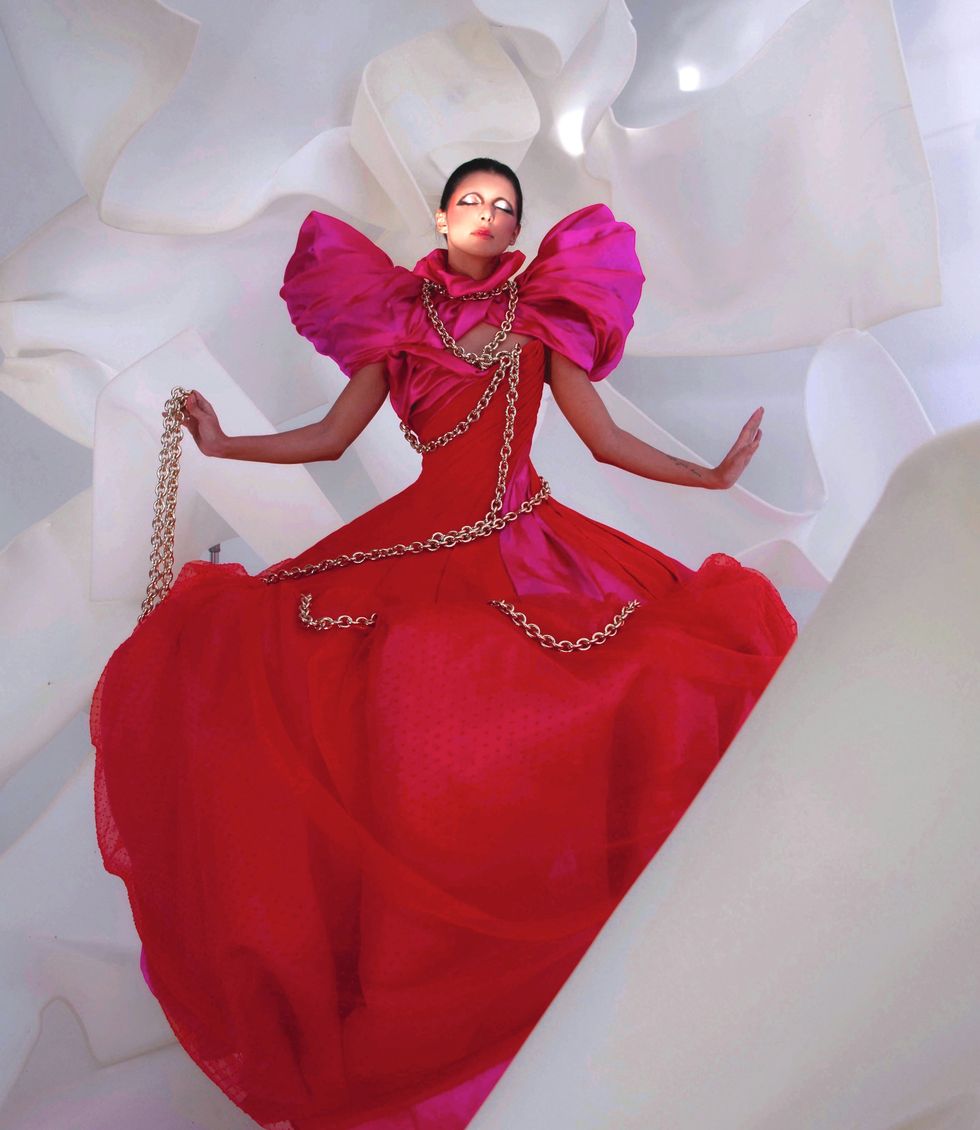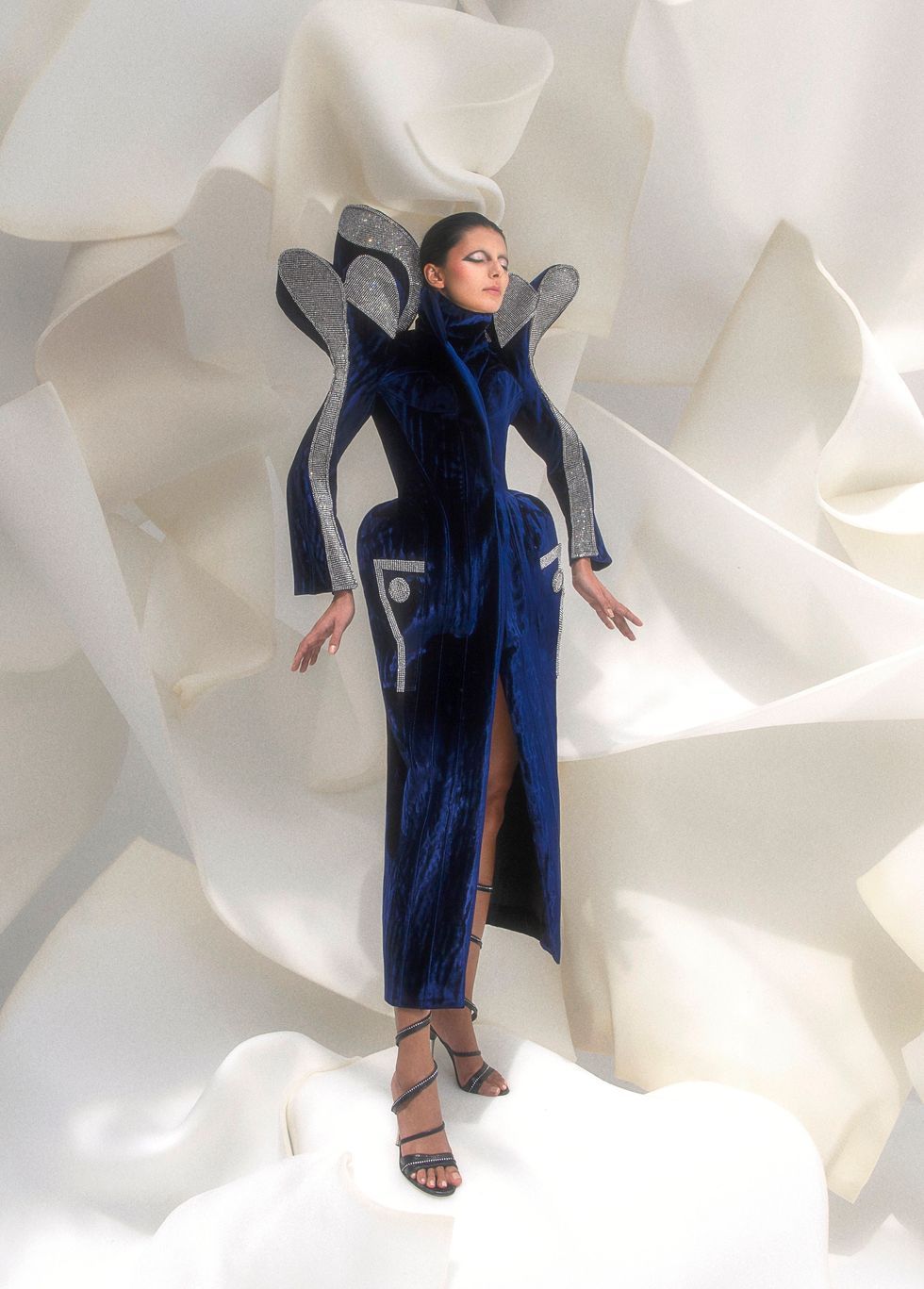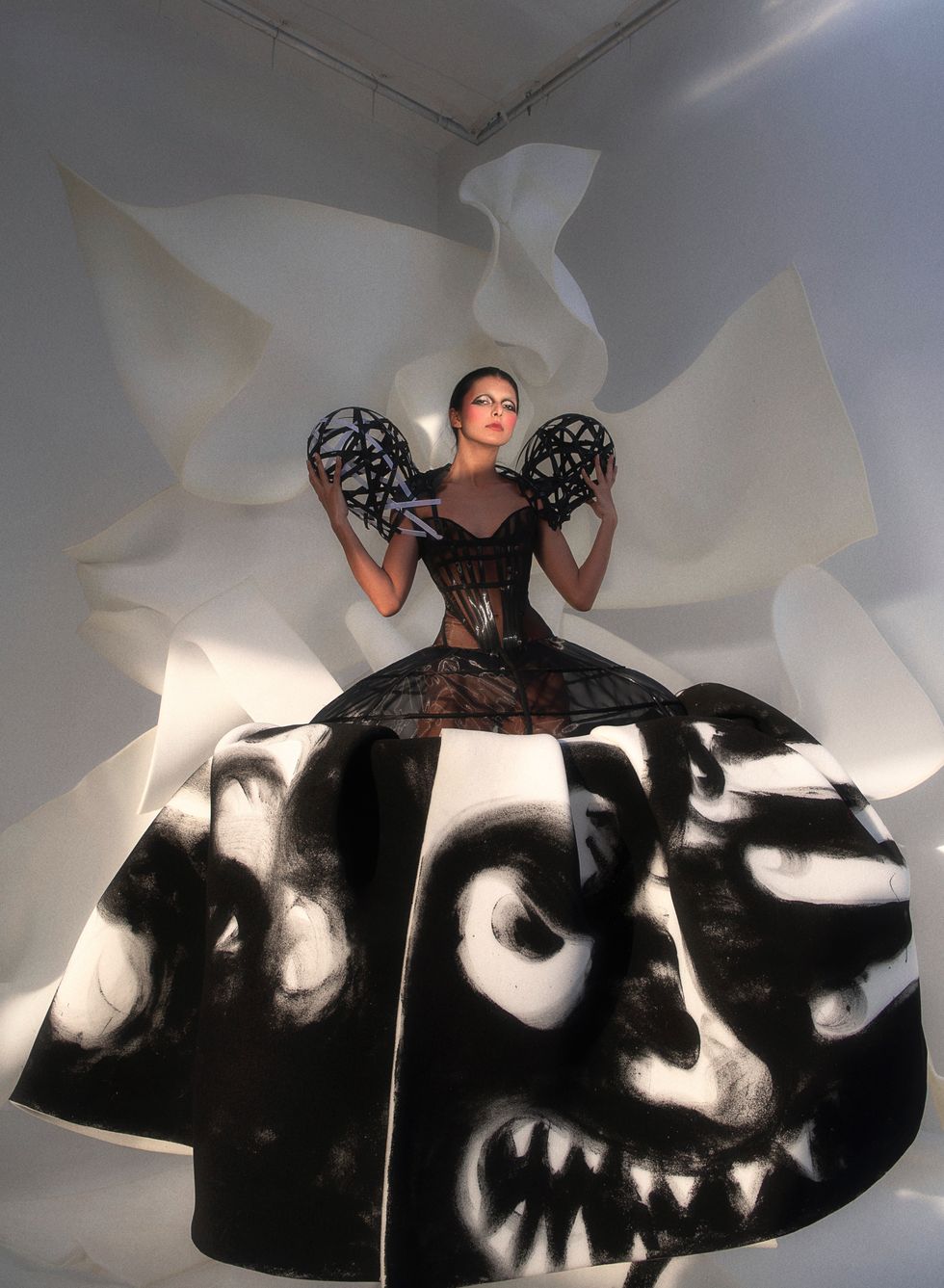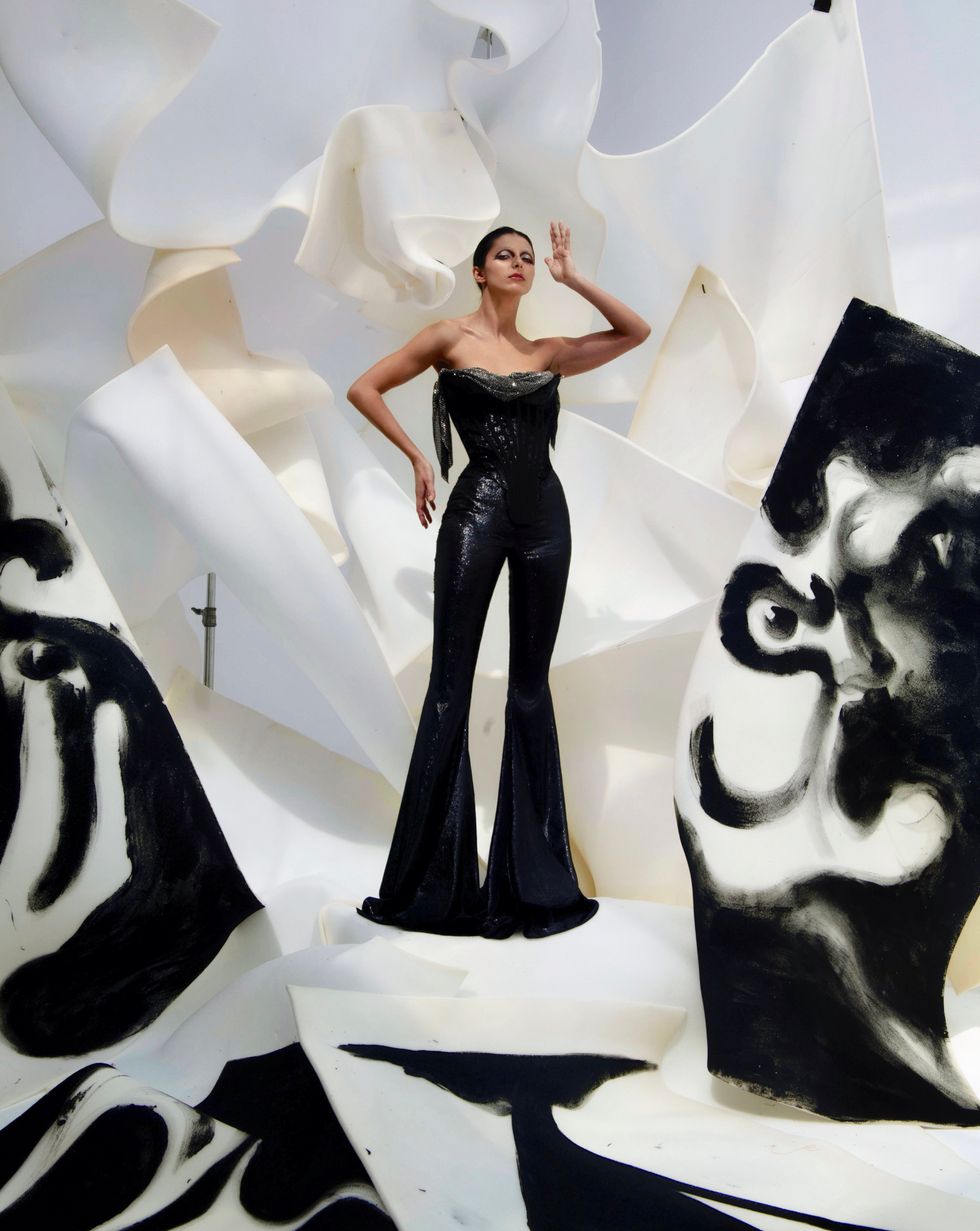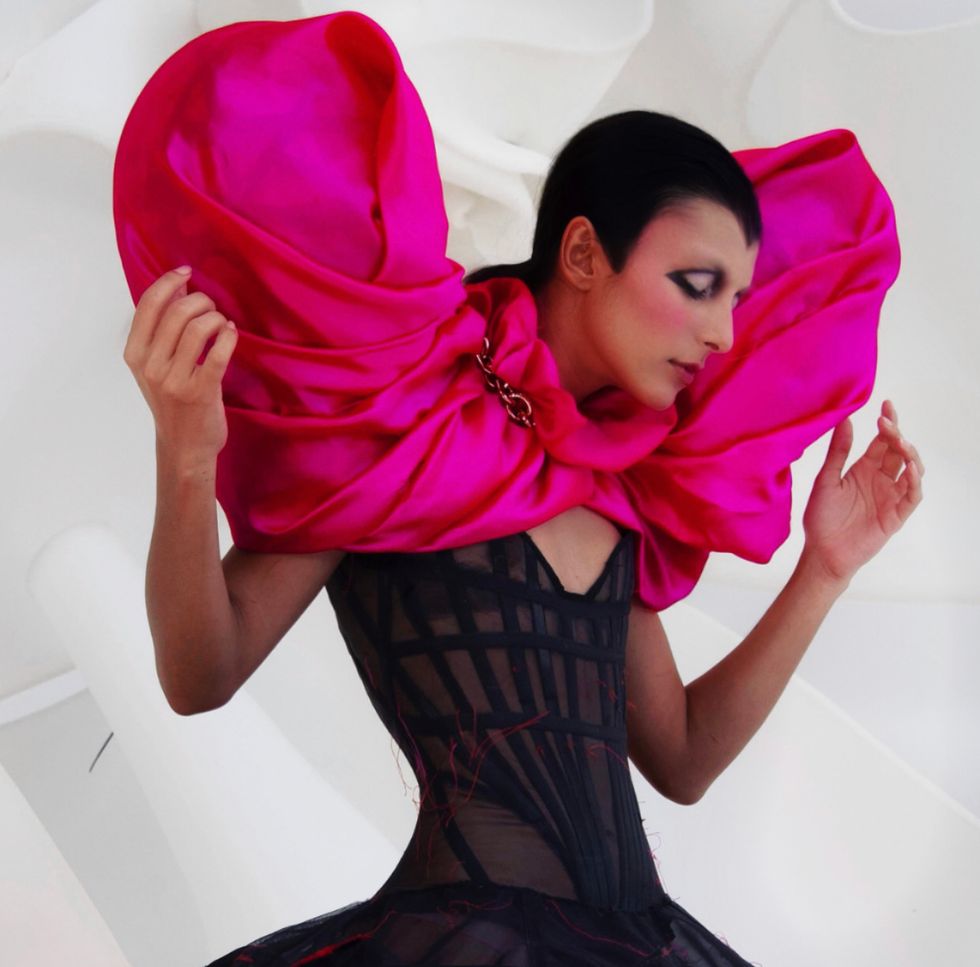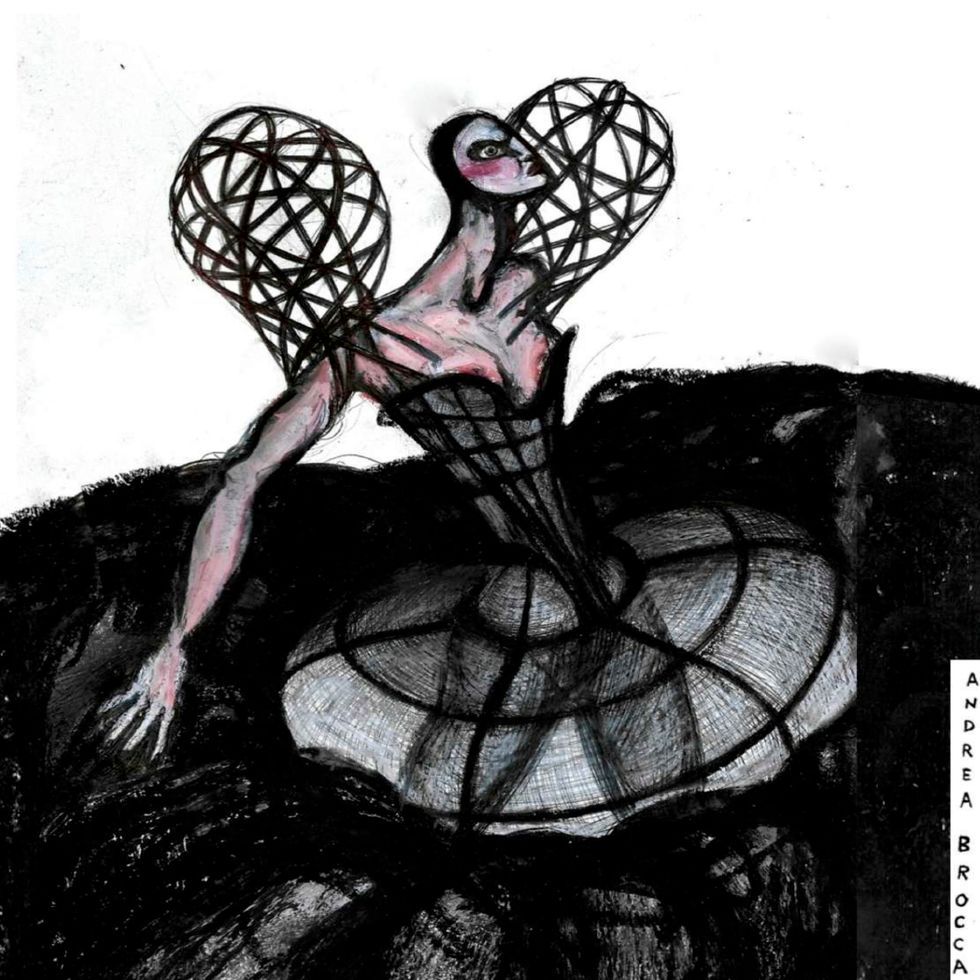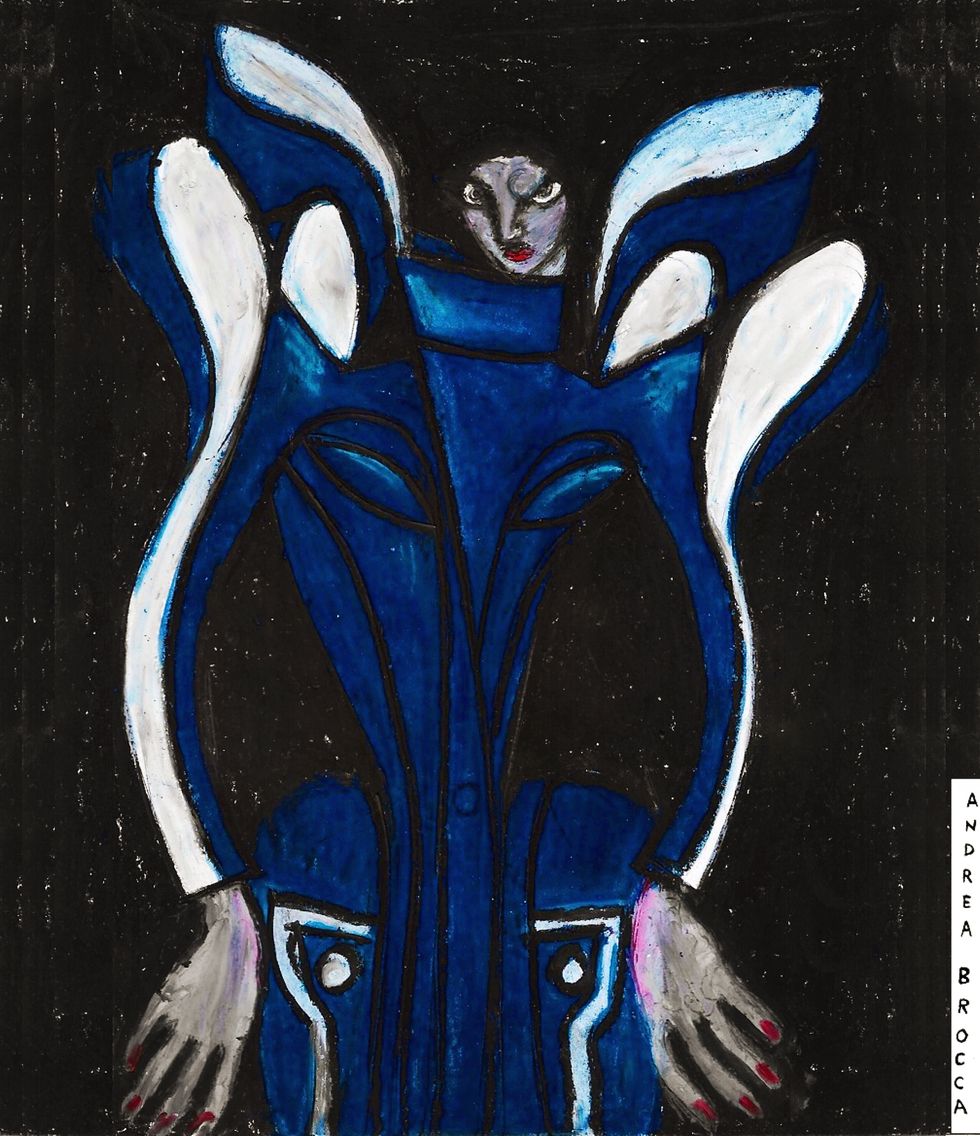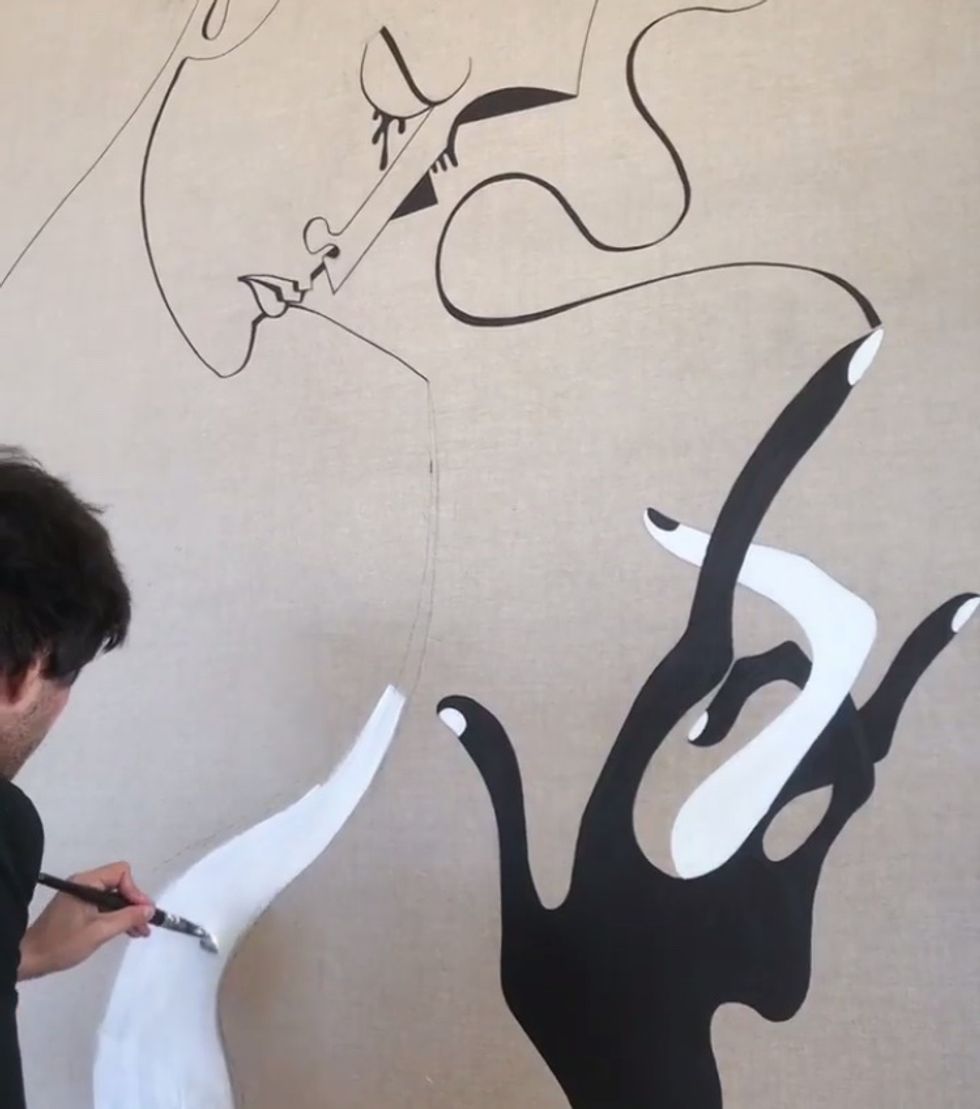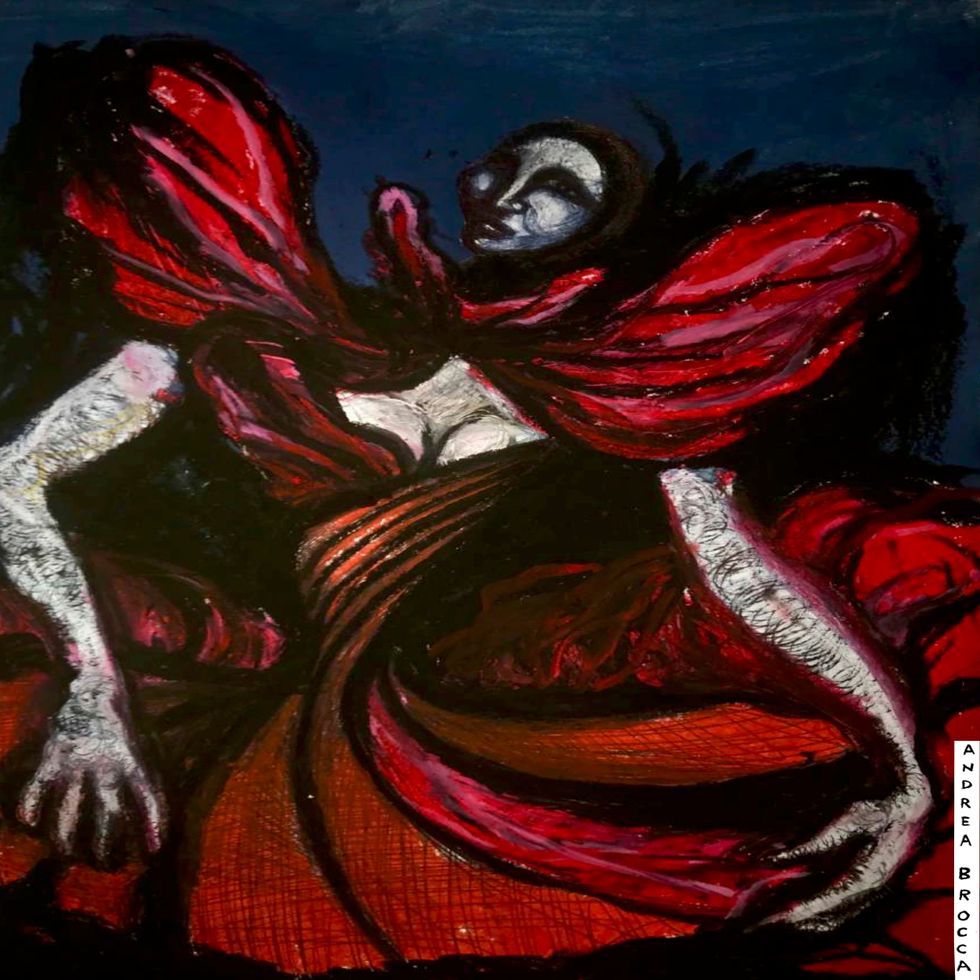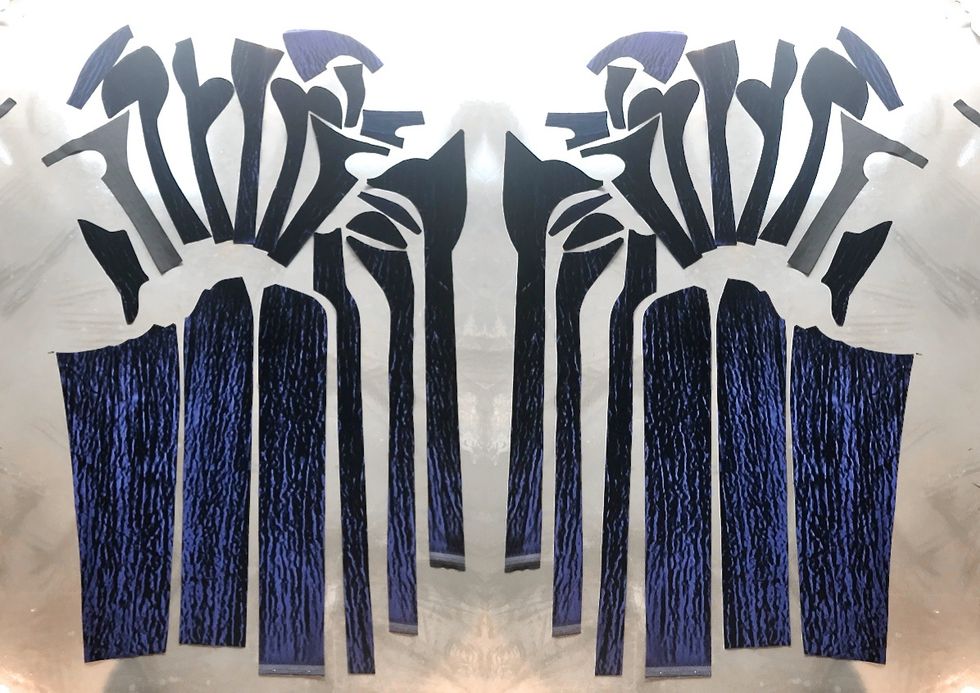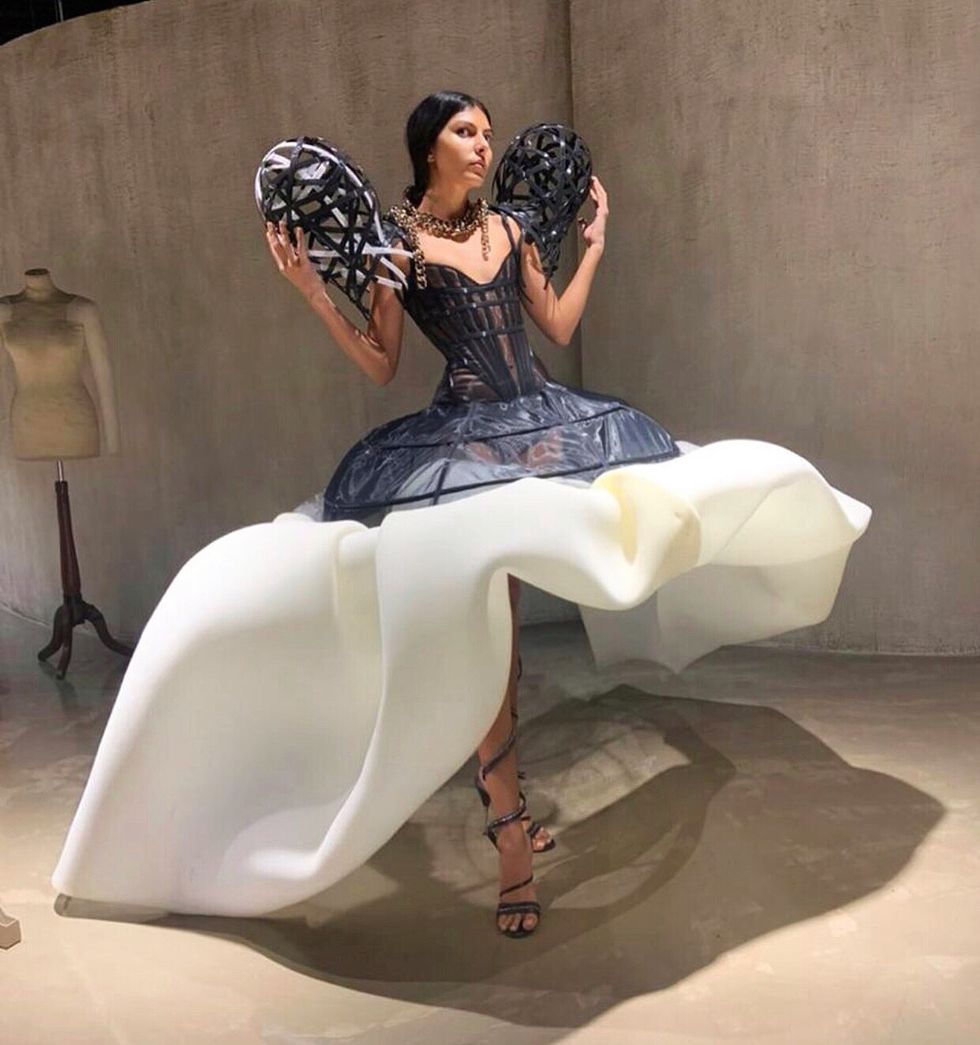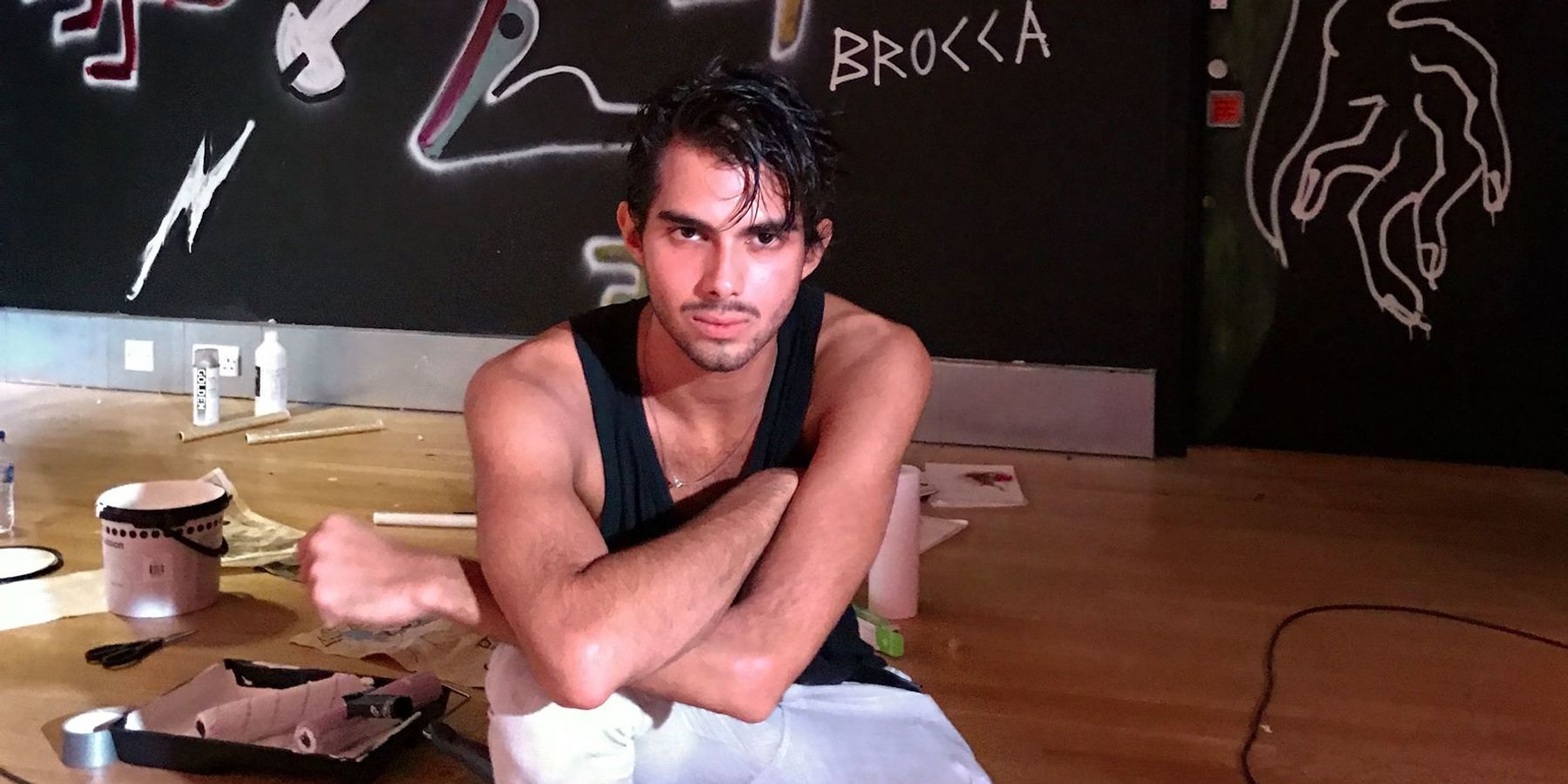
"We should not let people from the old guard control us," says 24-your-old courtier Andrea Brocca, hot on the heels of debuting his Spring 2021 collection online. "Because fashion is about trend, and trend is about you." At first glance the half-Italian, half-Sri Lankan designer might easily fall into the "emerging" category, but he's actually been working professionally for over a decade — even distinguished as Guinness World Record holder for youngest courtier back in 2012.
Brocca grew up in Dubai with a mother who both loved, collected and surrounded herself (and by proxy, Andrea) with luxury goods: Jean Paul Gaultier perfumes, Chanel 2.55 handbags. He would analyze and idolize, engrossing himself as much in the history of these items as the items themselves. At 17, he ran away from Dubai, dropping out of high school so he could attend the La Chambre Syndicale de la Couture Parisienne. Soon thereafter, he moved to Paris and was learning from the petit mains how to make couture garments. He's pinballed between London, New York, Paris and Milan since then, finally returning to Dubai to ride out the pandemic. In May, he graduated from esteemed Central Saint Martins, whose alumni include Alexander McQueen, John Galliano and Phoebe Philo.
Most recently, Lady Gaga sported Brocca's Monster gown on the cover of Billboard (Mother Monster in a Monster gown, how fitting), a moment he describes as mind-numbing. Gaga's team had emailed him one morning out of the blue. "Safe to say I face planked my table. They must've found me through my Instagram profile when I launched my brand... I can't stress enough how close you are to your dream collaboration. Keep on hustling. I detached myself from the hope that it would even be shot. I was just happy to know I was heard. That my craft was acknowledged. It was an incredibly humbling experience."
Below, Brocca spills a range of subjects, including graduating and putting out his first collection in the midst of a pandemic, how social media is changing fashion and why he's ready for a new guard to seize power in the fashion industry.
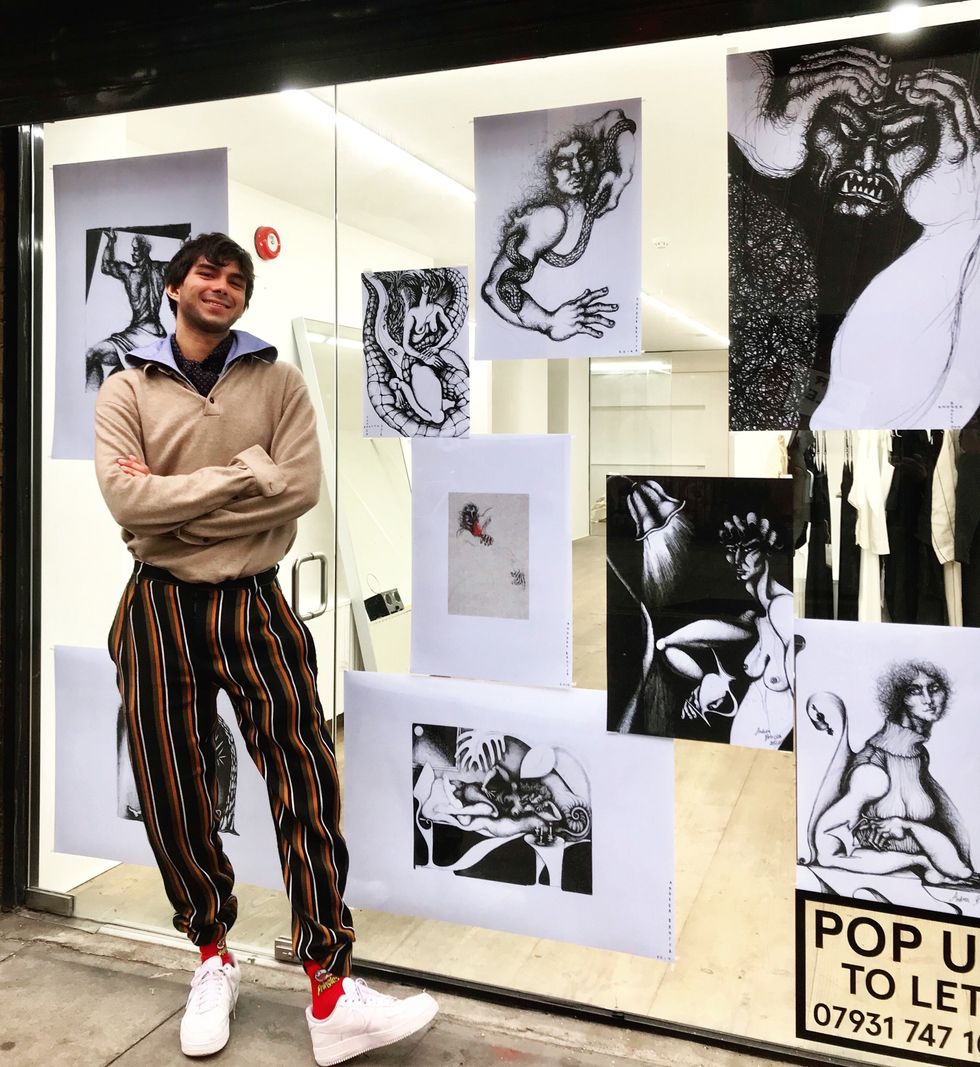
I want to start by asking how you define luxury.
I think luxury today is more of an idea of something that is sold to us rather than the actual understanding and feeling of what luxury is. I think it's an idea that big corporations sell to us. So Louis Vuitton will sell you a keychain for $200 and then a crocodile bag for $30K, and this gap is basically them telling you that you can buy a chunk of our luxury for a price which is accommodating to your budget. But that is not luxury, because I think luxury has a history behind what you are buying, a life which the item had before it reaches your hand, a life that is considered and a life that is educated. Luxury is highest quality, and highest quality is a representation of someone's education and their passion to create the object. That is why something like a McLaren is so expensive, when a Toyota Prius would be much less because the engineering behind the McLaren is so complex. Ferrari will not sell a car that has the quality of a Toyota and say that it's a Ferrari. That doesn't happen in the automobile industry, so why is it happening in the fashion industry?
Of all the Central Saint Martins grads, and the list is quite illustrious, who would you say you revere the most?
You know what, after having graduated during the pandemic, I don't want to mention any of the "icons" that previously graduated. I revere every single classmate that I graduated with. The class of 2020 from all over the world, high school included, had a rough fucking time. Respect to you — all of you. I love you. Let's show the world who's next. Who's in charge.
With that in mind, who is one CSM grad besides yourself that people ought to have their eye and pulse on?
James Walsh 3-D printed his whole collection and I think that's really cool! He has this software where he scans all his patterns and drapes them in the software and then he 3D prints the evolved pattern pieces with biodegradable plastic, and the whole process is zero waste. I think he deserves more attention, it's bad ass. Respect.
You were crowned World's Youngest Couturier by Guinness World Records in 2012. Talk to me about receiving this honor. Can you break down how you earned such a title?
I think I was pretty numb when I received it. I had just recently turned 16 at the time, but had been working hardcore in the industry since 13. At the time I didn't understand the weight that it represented. It was an honor, but I also felt like I had put in the work for this and deserved this because every single day of my life up to that point had been given to sketching and towards building my aim and my goal. Since primary school I just drew and drew and drew. And how did I receive it? I was working for Temperley London, because when I was 13 I went to an event — I was always assisting all the fashion magazines here in Dubai. It was a launch event and I kept on poking her back with my sketch book and by the third time she finally gave me her attention and I asked if I could show her my sketches. And she was like "this is really random." So towards the end of the night I followed her to the after party and showed her my sketches. She offered me an internship. I interned for two years and then designed a dress which sold out worldwide on Net-a-Porter, called the Andrea dress, and then this got me attention in Dubai. And through those articles I got funding, which allowed me to open my shop where I was able to make custom evening gowns. And then the evening gowns became quite popular, so I went into commerce and had clients and then came the award.
Easy peasy, eh? Multiculturalism is a big part of your design influence and aesthetic. Why was it important for you to bring your own multicultural identity to the forefront and many touch points within your design?
So I think what is successful design has to be a mixture of personal, environmental, political. It starts with you being able to break yourself apart and build yourself back up and creating a product which is a response to who you are. So that's why it takes years for creatives to pinpoint and understand who they are because they have to dissect themselves and who they are and then in turn create a product or an art piece which represents where they come from. So for me multiculturalism has been a very big dialogue in my life, and I feel forced to use it as a representation of the visuals of my brand, and the DNA of course, because I grew up in a multicultural city: Dubai. Dubai is like a desert oasis, it's a place full of expats. I grew up with dozens if not hundreds of nationalities, people from all over the world come here. And this for me created my understanding of the world. And I wanted to focus on my race because I figured if I don't know what my roots are then why would I bother creating something that is beautiful? I need to dissect my roots, understand my roots, and then from my roots I can take inspiration from my culture and create a multicultural image by referencing all my varied cultures into one aesthetic.
I was struck in a recent interview with V when you responded with a range of women including Queen Rania of Jordan, Angelina Jolie and Kim Kardashian West as three examples of who you envision wearing your pieces. That's quite a range, so perhaps a better question might be: Who do or what type of person is your clothing not for?
Interesting! I don't think I have the right to be this elitist, to be honest with you. I don't think I'm given this permission to be this cunty, to a degree. I don't want to be too political with this, but there's a few people in mind. I wouldn't want to be endorsed by someone who represents something very nasty in our society. I wouldn't want the wife of a negative political leader to wear my garments. And everyone else, if you love my garments and I have the time and you have the budget, fucking fabulous, let's do it.
How important is technical excellence? I feel like these days we see a lot of big visionaries making a name for themselves that lack the technical know-how.
Going back to the automobile industry, could Ford have made his cars without technical excellence? No. Could the machinery we are using today to communicate have existed without technical excellence? No. Without this passion that great scientists and creators had behind their inventions, we wouldn't have the world that we have today. Let's do our research. Let's have a bit of passion. If we don't have the passion to create something or learn how to be technically advanced, then why would we even bother to do it anyways? For me it's the beginning of your choice to enter a specific field that creates visual goods, and if you don't have that technicality I don't see why you would want to enter it. I mean there are visionaries for sure that are able to create a world on an Instagram profile because of their identities. And this is fabulous. But we must identify the difference between artistic director and designer couturier. I think fashion needs to step down from these creative director notions and perhaps be a bit more humble about their approach to representing a brand. Perhaps these superstars in fashion such as Karl Lagerfeld and Nicolas Ghesquière, maybe they were something of the past and fashion has to be down to technique again.
What's one fragrance that always turns you on?
Like sexually or artistically?
Both. Always both.
Christian Dior Poison and Her by Dolce & Gabbana, but they don't produce it anymore. Oh and Fragile by Jean Paul Gaultier and the Engineer by St. Giles. Very sexy. Oh God, and Nightclubbing by Hedi Slimane's Celine.
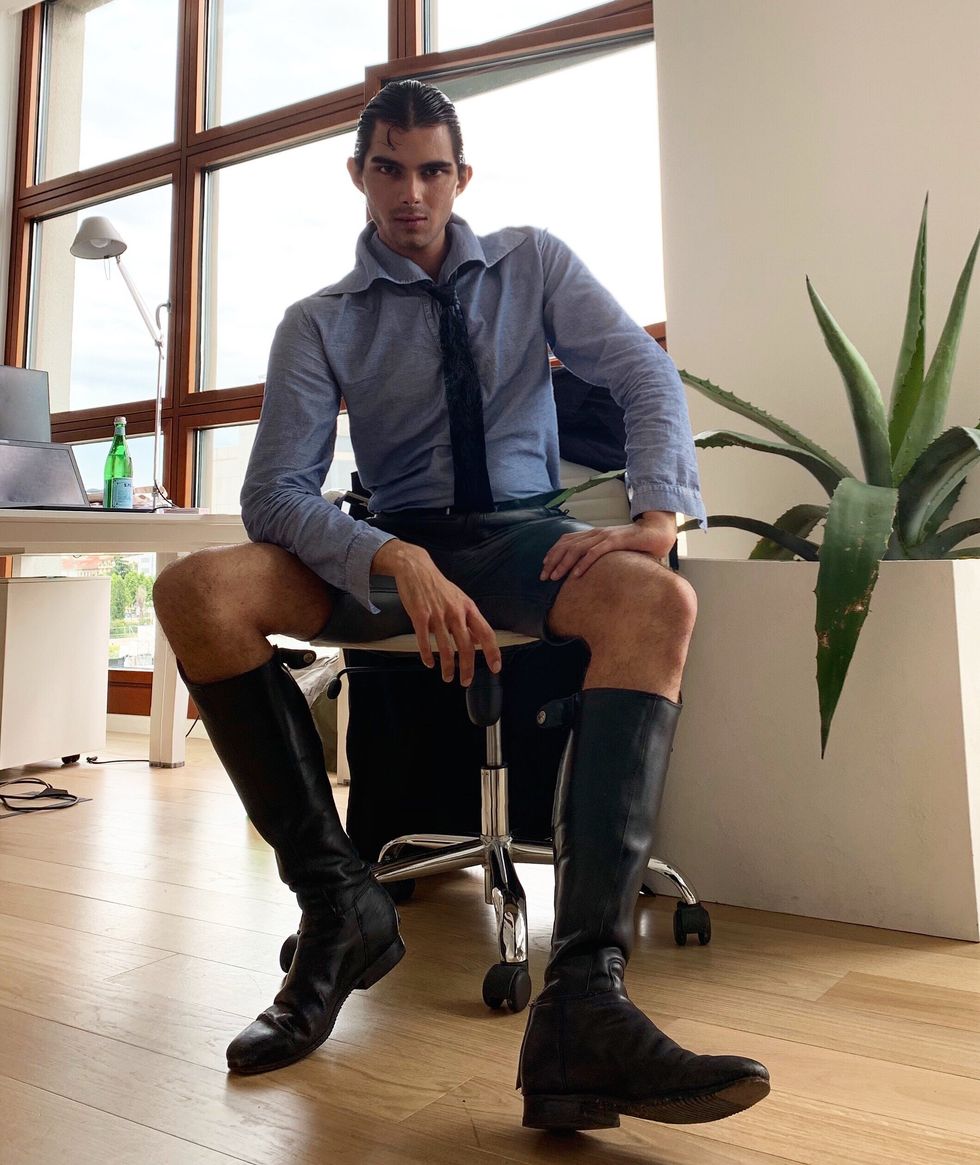
How has COVID affected your entry into professional life?
When the pandemic hit, my school kind of just cut us out, like canceled us, and didn't really give us any form of advantage. They didn't listen to us. It was very dictatorial. So it was kind of heartbreaking in the beginning, because I didn't know how I would approach the industry without the support of Central Saint Martins. Because I was out of the professional game at that point for seven years (once I left Dubai for the first time I chose to leave the brand to study and culture myself). But then I overcame the issue and when we launched I basically used COVID as a way to become hyper-aware of the e-market. So I started emailing thousands — and I mean thousands — of different stylists, clients, agencies, every single profile you can imagine in the industry, I DM-d, I emailed, here, there, non-stop.
And I wouldn't have been this way if COVID hadn't happened. I had to understand that I would never have the same opportunities that I would in person so therefore I need to be more visually stimulating and create an interesting film which is what we did. People are living their own lives. They don't care about anyone else at the moment. Many are trying to put food on their plate. And especially during a pandemic. So it's your responsibility as a designer, as an artist, to understand that people will not give you anything unless you fight for it.
We often talk about great designers, but who do you think are some of the greatest designers when it comes to articulating process or even just expanding their aesthetic framework beyond the tangible?
I have a long lasting love for the Anglo-American couturier called Charles James. He was a fashion architect who Dior and Balenciaga revered and took guidance from. Just to put things into perspective, Dior called James "the greatest talent of [his] generation." Can you even imagine?! One of the biggest mysteries to me has always been how such incredible talent can be overlooked in today's pop culture because of their inability to dabble into the commerce of fashion, but that's just the world. James suffered deeply from his inability to adapt to the mass market, in contrast to Halston (at one point his collaborator) who emulated him deeply, and did so in a very astute manner, and was able to successfully tackle the mass market.
I respect Lagerfeld for having always been able to evolve with the world and adapt his vision to the ever-changing political climate of western culture. This allowed Chanel to always stay at the forefront of pop culture from 1983 to 2019. Like many, I'll always have a crush on Tom Ford; his sex appeal is so effective that it is transparent, transparent enough to monetise.
It's undeniable that social media has changed the landscape for fashion, particularly in bolstering brands that might previously not have been given adequate shine. Tell me one great thing about social media and one detrimental thing from the vantage point of a young designer like yourself.
Detrimental is self-comparison. Humans understand the world through the people around them. Humans are social animals who mirror each other, so people need reference points to know that they are doing life well, and social media unfortunately really points steroids into that mind frame. People look at each other far too much to size up their competition and especially in the arts when your worth is put on your personal creation, unless you're Zara who just copies, you're fucked. And then you have people copying each other because they want that metric of success for themselves and that's where you begin to lose your identity. The positive thing is that you can reach out to anyone and have an equal chance to be heard, whether you are the Queen of England or a worker with low advantage. The only thing that stops people from reaching out is their self-confidence and questioning whether or not they have something valid to say.
Welcome to "Wear Me Out," a column by pop culture fiend Evan Ross Katz that takes a look at the week in celebrity dressing. From award shows and movie premieres to grocery store runs, he'll keep you up to date on what your favorite celebs have recently worn to the biggest and most inconsequential events.
Photos courtesy of Andrea Brocca
From Your Site Articles
- Lady Gaga on the Transformative Power of Makeup - PAPER ›
- Lady Gaga Opens Up About Her Mental Health, Self-Harm, and ... ›
- The Star of Lady Gaga's '911' ›
Related Articles Around the Web
